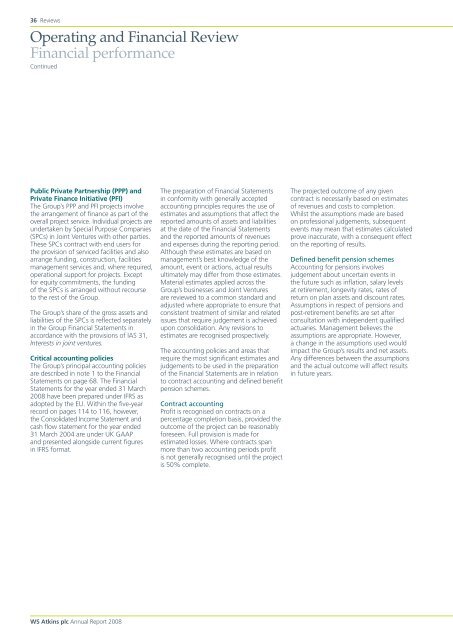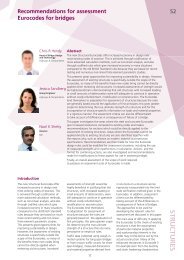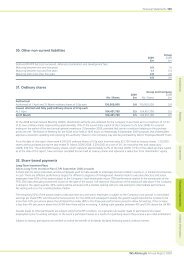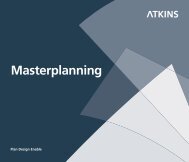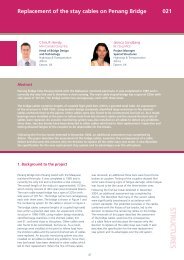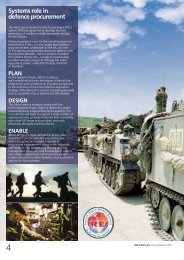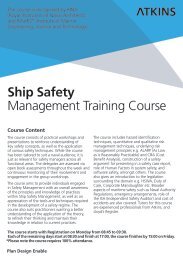View - Atkins
View - Atkins
View - Atkins
Create successful ePaper yourself
Turn your PDF publications into a flip-book with our unique Google optimized e-Paper software.
36 Reviews<br />
Operating and Financial Review<br />
Financial performance<br />
Continued<br />
Public Private Partnership (PPP) and<br />
Private Finance Initiative (PFI)<br />
The Group’s PPP and PFI projects involve<br />
the arrangement of finance as part of the<br />
overall project service. Individual projects are<br />
undertaken by Special Purpose Companies<br />
(SPCs) in Joint Ventures with other parties.<br />
These SPCs contract with end users for<br />
the provision of serviced facilities and also<br />
arrange funding, construction, facilities<br />
management services and, where required,<br />
operational support for projects. Except<br />
for equity commitments, the funding<br />
of the SPCs is arranged without recourse<br />
to the rest of the Group.<br />
The Group’s share of the gross assets and<br />
liabilities of the SPCs is reflected separately<br />
in the Group Financial Statements in<br />
accordance with the provisions of IAS 31,<br />
Interests in joint ventures.<br />
Critical accounting policies<br />
The Group’s principal accounting policies<br />
are described in note 1 to the Financial<br />
Statements on page 68. The Financial<br />
Statements for the year ended 31 March<br />
2008 have been prepared under IFRS as<br />
adopted by the EU. Within the five-year<br />
record on pages 114 to 116, however,<br />
the Consolidated Income Statement and<br />
cash flow statement for the year ended<br />
31 March 2004 are under UK GAAP<br />
and presented alongside current figures<br />
in IFRS format.<br />
The preparation of Financial Statements<br />
in conformity with generally accepted<br />
accounting principles requires the use of<br />
estimates and assumptions that affect the<br />
reported amounts of assets and liabilities<br />
at the date of the Financial Statements<br />
and the reported amounts of revenues<br />
and expenses during the reporting period.<br />
Although these estimates are based on<br />
management’s best knowledge of the<br />
amount, event or actions, actual results<br />
ultimately may differ from those estimates.<br />
Material estimates applied across the<br />
Group’s businesses and Joint Ventures<br />
are reviewed to a common standard and<br />
adjusted where appropriate to ensure that<br />
consistent treatment of similar and related<br />
issues that require judgement is achieved<br />
upon consolidation. Any revisions to<br />
estimates are recognised prospectively.<br />
The accounting policies and areas that<br />
require the most significant estimates and<br />
judgements to be used in the preparation<br />
of the Financial Statements are in relation<br />
to contract accounting and defined benefit<br />
pension schemes.<br />
Contract accounting<br />
Profit is recognised on contracts on a<br />
percentage completion basis, provided the<br />
outcome of the project can be reasonably<br />
foreseen. Full provision is made for<br />
estimated losses. Where contracts span<br />
more than two accounting periods profit<br />
is not generally recognised until the project<br />
is 50% complete.<br />
The projected outcome of any given<br />
contract is necessarily based on estimates<br />
of revenues and costs to completion.<br />
Whilst the assumptions made are based<br />
on professional judgements, subsequent<br />
events may mean that estimates calculated<br />
prove inaccurate, with a consequent effect<br />
on the reporting of results.<br />
Defined benefit pension schemes<br />
Accounting for pensions involves<br />
judgement about uncertain events in<br />
the future such as inflation, salary levels<br />
at retirement, longevity rates, rates of<br />
return on plan assets and discount rates.<br />
Assumptions in respect of pensions and<br />
post-retirement benefits are set after<br />
consultation with independent qualified<br />
actuaries. Management believes the<br />
assumptions are appropriate. However,<br />
a change in the assumptions used would<br />
impact the Group’s results and net assets.<br />
Any differences between the assumptions<br />
and the actual outcome will affect results<br />
in future years.<br />
WS <strong>Atkins</strong> plc Annual Report 2008


